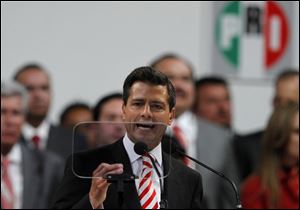
Mexico's ruling party votes to reform energy sector
Government to allow sales tax on food, medicines
3/4/2013
Mexico's President Enrique Pena Nieto delivers a speech during the national convention of the Institutional Revolutionary Party (PRI) in Mexico City. Mexico's ruling party changed on Sunday its platform to allow a reform that could bring private investment into the state-owned oil monopoly, in a country where oil is a source of national pride.
MEXICO CITY — Mexico's ruling party changed its platform on Sunday to allow for private investment in the oil industry, paving the way for a possible overhaul of a state-owned company that is seen as a pillar of the country.
Nearly 5,000 members of the Institutional Revolutionary Party, also known as the PRI, voted unanimously at their national convention to remove language in the party's platform that for years had opposed injecting private money in the sector. Petroleos Mexicanos, or Pemex, is the only company that can carry out oil refining. The party also erased its opposition to sales taxes on food and medicines.
President Enrique Pena Nieto, who led last year's electoral comeback for the party that governed from 1929 to 2000, said the energy and fiscal reforms are needed for Mexico to become more competitive. He urged party members to support him when he sends the bills to Congress, likely in the second half of this year.
"The PRI is seeking renovation to bring the changes Mexico needs," Pena Nieto told a crowd of thousands. "The PRI is not pleased and it is choosing to reexamine and redefine where it stands on the challenges facing the country."
Pena Nieto's intention of opening the oil behemoth to more private and foreign investment has set off warnings among leftists about the privatization of an enterprise whose nationalization is seen by the left as a source of national pride.
Pena Nieto has previously denied any plans to privatize Pemex. On Sunday, party president Cesar Camacho repeated that the Pemex would stay in state hands, saying "We share the need of an energy reform for better growth, keeping the state's control, but modernizing the industry to reach its full potential and making sure the exploitation of our resources benefits everyone."
A meeting of opposition mayors called for protests in mid-March to oppose the ruling PRI's new platform.
After Sunday's decision, analysts said they expect the PRI to put forward a unified front when the bills are voted upon. The PRI doesn't hold a majority in Congress, but it's the strongest legislative block with 241 of 500 representatives. Pena Nieto has also built consensus in other issues with the opposition parties.
"The party is leaving behind its old taboos to be able to discuss the reality of the country," said Alejandro Schtulmann, head of research of the firm Emerging Markets Political Risk Analysis.
During the PRI's 12-year hiatus from presidency, its members firmly opposed such measures proposed by then-ruling National Action Party, arguing the country would lose sovereignty by allowing foreign investment in Pemex. They also alleged that taxing for food and medicines' purchases would severely affect the poor.
"The PRI wanted to wait until it had the presidency," said Schtulmann.
Though oil is a sensitive topic for many Mexicans who learn state ownership is one of the three main principles of the constitution, its production has fallen year after year. But most of the country's reserves remain untapped because Pemex lacks the technology for exploration.
Calderon was able to sign a law to allow exploration deals with foreign companies but political resistance makes the sealing of such contracts difficult. At the same time, Mexico's government relies on oil revenues for about a third of its budget.